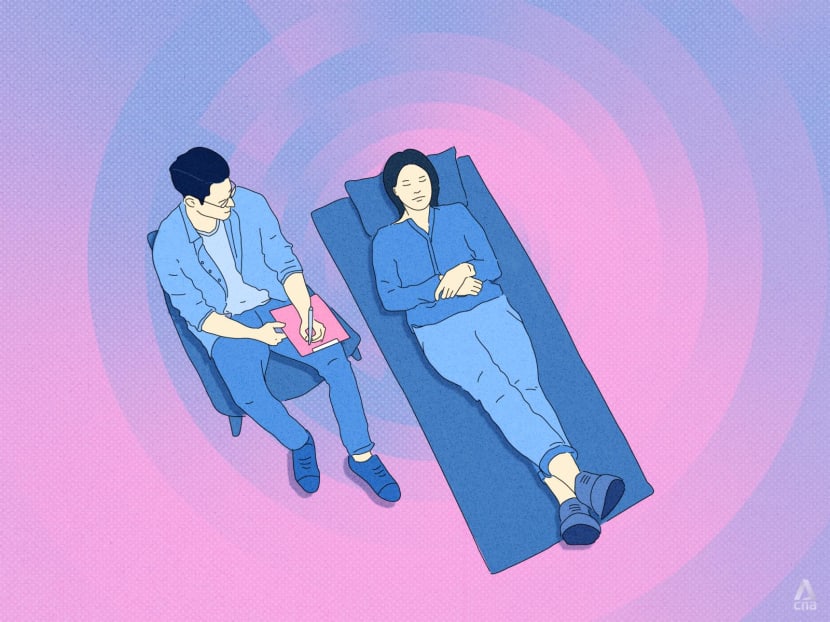Can hypnosis make you a better worker? For some, it's a secret weapon
Practitioners cautioned that hypnotherapy is best used as a supplement to other forms of therapy, and there are situations where it may not be effective or worsen a mental health problem.

CNA TODAY's Eunice Sng tried out a S$300 hypnotherapy session to see if it could help her boost her work performance. (Illustration: CNA/Samuel Woo)

This audio is generated by an AI tool.
Lying down on a bed, I counted down from 50 to zero. A therapist asked me to close my eyes and imagine all the tension flowing out of my body in lights and colours.
I decided to try hypnotherapy, an alternative form of therapy that uses hypnosis, after reading an article about how business leaders have used it to tackle setbacks in the workplace such as speech anxiety and low confidence.
Could this work for me? I find myself constantly distracted when I need to finish a piece of writing in one sitting. But as a journalist with tight deadlines, this is not ideal.
So I thought that hypnotherapy could potentially help overcome my lack of focus, given that other self-help strategies have failed.
The practice of hypnotherapy is not new. After doing some research, I found that some high-profile personalities had undergone hypnotherapy to solve a myriad of problems.
For instance, Tiger, a 2021 documentary on cable channel HBO, revealed that golfer Tiger Woods practised a form of self-hypnotising to achieve maximum concentration while playing tournaments.
So what exactly is this technique? Is it a legitimate form of therapy that can deal with a broad range of issues, or simply an age-old showmanship tactic of swinging a pendulum in front of a patient to make them follow commands?
The thing is, my experience left me confused.
Although I did feel relaxed, I could not say that I entered a trance-like state where I suddenly became more in tune with my subconscious mind, which was what the therapist said I was supposed to feel.
He prodded me to think about instances from my childhood where I had low self-esteem, which I thought was unrelated to my inability to concentrate for long periods.
Apparently, he wanted to explore whether any deep-seated issues could have contributed to my current problem and encouraged me to form my own conclusions based on the experience.
I felt that this was not exactly helpful, especially after I paid a hefty S$300 fee for one session.
But perhaps a single session is not enough. Maybe I was not yet open to immersing myself completely in the process, since it was my first time meeting this hypnotherapist.
What this meant is that it might take more time, and therefore more paid sessions, for me to trust him.
My own one-off experience aside, hypnosis appears to have some positive effects on other people, if the glowing reviews given to numerous hypnotherapy clinics can be trusted.
My scepticism slowly morphed into curiosity. I wanted to figure out why these people were choosing hypnotherapy to tackle their performance problems and how exactly it has helped them.
So I spoke to mental health experts to understand more about this lesser known form of therapy, as well as its benefits and limitations.
HOW HYPNOTHERAPY WORKS
The experts I approached said that hypnosis works by guiding patients into a mental state where they are more dissociated from their bodies.
Dissociation happens when certain facets of mental functioning become separated from conscious awareness.
In this relaxed state, the mind’s usual distractions are minimised, allowing the person to become more attuned to new ideas and to modifying his or her habits.
Dr Paul Patinadan is a psychology professor from Nanyang Technological University who researches interventions for well-being.
He said: “Suggestions by the hypnotherapist are used to evoke changes in sensation, perception, thinking, feeling or motor behaviour.”
Clinical hypnotherapist Joachim Lee, who runs his private practice Neuro-Therapy, said that the mind becomes more open to new possibilities, allowing it to reframe behaviours or emotions in ways that can lead to therapeutic change.
My therapist, for example, did exercises such as asking me to imagine a wave of relaxation coursing through my muscle fibres, and to visualise getting calmer while walking down a flight of stairs.
When I reached the bottom of the stairs, I was supposed to feel like my body was "entirely made of light".
He then guided me to recall the most vivid moment when I lost focus and could not regain it.
After describing that instance, he asked me to remember earlier times when I had experienced similar sensations.
Later on, he asked me to imagine three versions of my younger self walking into a room, and all of these individuals, including the current me, rubbing their hands together while repeating self-affirmative statements to "release the emotional attachment to past events".
I guess I was not that much of a visual learner, which impeded my ability to fully appreciate the experience.
The experts I interviewed acknowledged that there are many misconceptions about hypnotherapy due to biased perceptions in the media.
They stressed that the practice is not “sleep, mind-control or brainwashing”.
These professionals said that their clients remain in control and can terminate the session if they feel uncomfortable.
Psychotherapist Raymond Tay who works at his private practice Collaborative Change said: “Some clients may associate hypnotherapy with stage hypnosis, which often focuses on entertainment rather than therapeutic benefits.
“Additionally, movies sometimes portray hypnosis as manipulative or magical, which is misleading.”
Stage hypnosis is often performed before audiences in theatres or clubs, while hypnotherapy is normally conducted in private settings.
HOW HYPNOTHERAPY HELPS TO MAKE YOU A BETTER WORKER
The mental health professionals agreed that hypnotherapy can help with workplace performance, such as staying focused and calm when doing tasks.
During hypnosis, the therapist uses regression techniques to take clients back to past experiences that may be affecting their current performance.
This is often used to resolve issues such as self-limiting beliefs, imposter syndrome, or fear of failure.
Clinical hypnotherapist Lee Kai Xuan said: “We then attempt to replace negative thought patterns with empowering beliefs.
“We may also guide the client to visualise themselves in specific workplace scenarios and apply their newfound knowledge to find success.”
For psychotherapist and executive coach Jonathan Marshall, he said that for clients who get distracted easily, he would ask them to visualise getting distracted, then visualise themselves being successful at work and managing distractions well.
“And then I’d ask you, what are the key things that might make the difference? And then, while in a trance, ask you, would you like to try and implement those for, let’s say, three hours or a day or a time-limited period?”
Hypnotherapy is often not a stand-alone approach. Psychotherapists argued that the practice is largely supplementary and works best in conjunction with other training or therapeutic approaches.
Mr Stephen Lew, who founded The School of Positive Psychology, said that he applies hypnotherapy with other interventions such as cognitive behavioural therapy.
Cognitive behavioural therapy is a type of talking therapy that identifies patients' unhelpful thoughts through dialogue and analysis, and then encourages them to change their behavioural patterns.
It employs the conscious mind, unlike hypnotherapy which focuses on unlocking subconsciousness.
“This integrative approach helps leaders dig into their inner resources, overcome subconscious blocks, and foster resilience,” Mr Lew added.
WHAT TO WATCH FOR WHEN SEEKING HYPNOTHERAPY
Having said that, the experts added that hypnotherapy has its limitations.
Some people are more “hypnotisable” than others and they tend to be more receptive to its effects.
Dr Marshall said that creative people who can become absorbed in imaginary worlds such as books and movies are more likely to respond well to hypnosis.
Associate Professor Stuart Derbyshire from the National University of Singapore’s department of psychology said: “Scientists tend to be less hypnotisable and artists tend to be more hypnotisable.
“That’s likely because scientists tend to analyse what is happening, which totally kills the procedure, whereas artists are more likely to just go with it, which is the attitude needed for hypnosis.”
Additionally, there are some situations where hypnotherapy is less effective or can even be dangerous.
Mr Lew said that hypnosis is not recommended for patients with severe clinical issues such as schizophrenia or personality disorders due to the risk of exacerbating symptoms or inducing dissociation.
For treating pain, Dr Marshall said that if someone with a hand injury uses hypnosis to dissociate themselves from their pain until they do not feel it at all, when they put their hand on a hot plate in the kitchen, they might not know it is burning until they smell it.
He also cautioned that the hypnotherapy sector is rather unregulated and people should be discerning when selecting a hypnotherapist.
“This is a big problem because anyone can study hypnosis.
“In many hypnosis schools, you receive a certificate of attendance, so you may have very little skill, practice and supervision, but you still get a piece of paper at the end of it saying you’re a hypnotist.”
Dr Marshall said that if he were a client, he would choose a therapist who has "training in the mind" in addition to knowing hypnotherapy. This refers to professionals such as psychiatrists and clinical psychologists with postgraduate qualifications in these specialisations, for example.
Mr Lew said: “In Singapore, the mental health training industry is still relatively young. There is significant potential for growth in developing similar accreditation frameworks like in the United States and the United Kingdom for hypnotherapy.”
As for me, am I willing to give hypnotherapy a second chance?
Having spoken to the experts, I am more convinced that hypnotherapy can potentially produce dramatic changes in certain people, and perhaps in myself as well.
That is as long as I keep my mind open to the idea and learn how to visualise better, while taking note of the risks flagged by these experts.
Even then, I have to admit that repeated hypnotherapy sessions may be somewhat outside my budget. To this, my therapist suggested picking up self-hypnosis techniques as another avenue.
After all, if it helped Tiger Woods clinch championships, then perhaps this could be my secret weapon.








